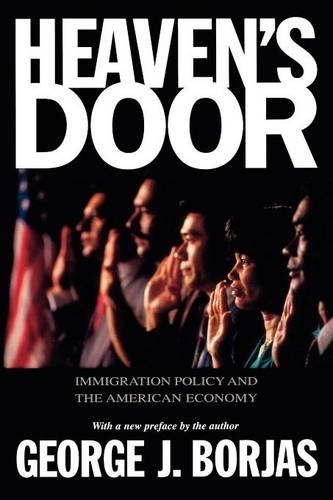
Heaven's Door: Immigration Policy and the American Economy
(Paperback, Revised edition)
Publishing Details
Heaven's Door: Immigration Policy and the American Economy
By (Author) George J. Borjas
Princeton University Press
Princeton University Press
26th June 2001
Revised edition
United States
Classifications
Professional and Scholarly
Non Fiction
Central / national / federal government policies
Political economy
325.73
Runner-up for AAP/Professional and Scholarly Publishing Awards: Government and Political Science 1999
Physical Properties
Paperback
296
Width 152mm, Height 235mm
425g
Description
The US took in more than a million immigrants per year in the late 1990s, more than at any other time in history. For humanitarian and many other reasons, this may be good news. But as George Borjas shows in this text, it's decidedly mixed news for the American economy - and positively bad news for the country's poorest citizens. Borjas reveals that the benefits of immigration have been greatly exaggerated and that, if we allow immigration to continue unabated and unmodified, we are supporting an astonishing transfer of wealth from the poorest people in the country, who are disproportionate minorities, to the richest. In the course of the book, Borjas carefully analyzes immigrants' skills, national origins, welfare use, economic mobility, and impact on the labour market, and he makes use of new data to trace current trends in ethnic segregation. He also evaluates the implications of the evidence for the type of immigration policy that the US should pursue.
Reviews
Honorable Mention for the 1999 Award for Best Professional/Scholarly Book in Government and Political Science, Association of American Publishers "[A] tour de force on the economics of immigration. In the policy area where emotion or ideology usually overwhelms analysis, this is a stunning piece of research--nuanced, lucid and forceful... This is an enormously impressive book."--Peter Skerry, The Washington Post "For an impressively researched, brightly written and tightly argued polemic against America's current liberal immigration policy, look at Heaven's Door."--Sylvia Nasar, New York Times "A former Cuban refugee, Borjas addresses vexing questions in the U.S. immigration debate, offering an up-to-date and informative assessment of the modern immigrant experience and an excellent review of the recent academic research."--Foreign Affairs "Borjas is the leading American economist conducting research and writing about immigration policy. A mervelous read..."--Library Journal "Borjas is a remarkably clear guide to the issues... Borjas, one is convinced, is acting from concern for the public good as his research has revealed it to him."--Nathan Glazer, Harvard Magazine "Will probably become the most influential, widely read study of the subject."--Choice "I highly recommend this book. It is written in a very accessible style; the arguments are easy to follow by nonexperts... For those who might want to consider some important facts that bear on the future of immigration to the United States, though, I would urge them to read this book."--Jim Gimpel, Political Science Quarterly "A thoughtful, sophisticated and richly informative book that merits close attention."--Stephan Thernstrom, Times Literary Supplement "A lively and penetrating investigation of the economic dimension of immigration in the US ... Borjas is an acknowledged master of inventive economic reasoning and theory, and he makes impressively extensive use of census and other data on immigrants. He, more than anyone, has brought the theoretical and methodological apparatus of contemporary economics to bear on immigration, and his contribution to the growth of the field has been considerable."--Jeffrey G. Reitz, Journal of International Migration and Integration "Heaven's Door is by far the best introduction I have seen to the economics of immigration."--New York Review of Books
Author Bio
George J. Borjas is Pforzheimer Professor of Public Policy at the John F. Kennedy School of Government Harvard University and a Research Associate at the National Bureau of Economic Research. He is the author of several books, including Wage Policy in the Federal Bureaucracy, Friends or Strangers: The Impact of Immigrants on the U.S. Economy and Labor Economics.
